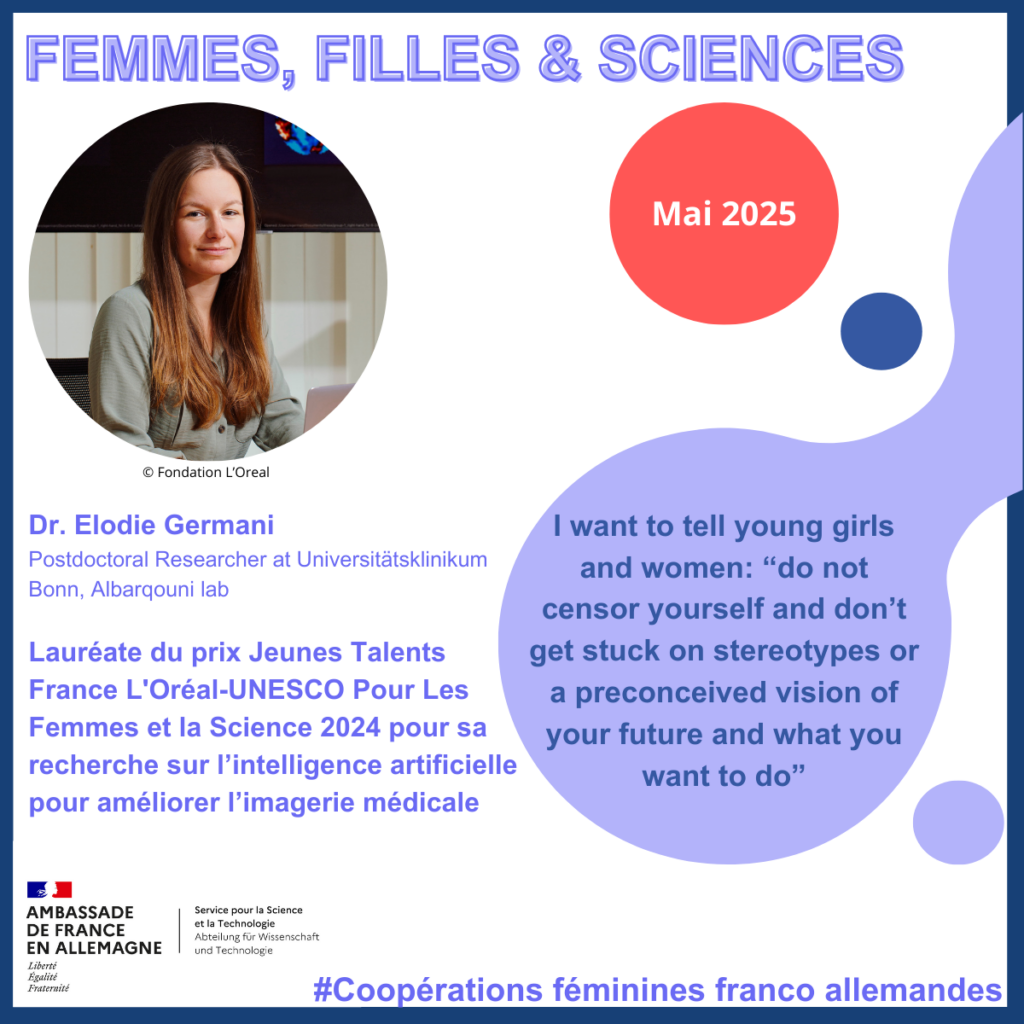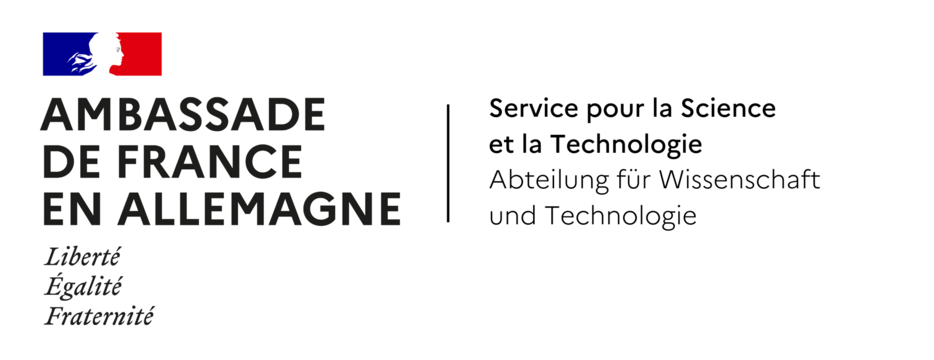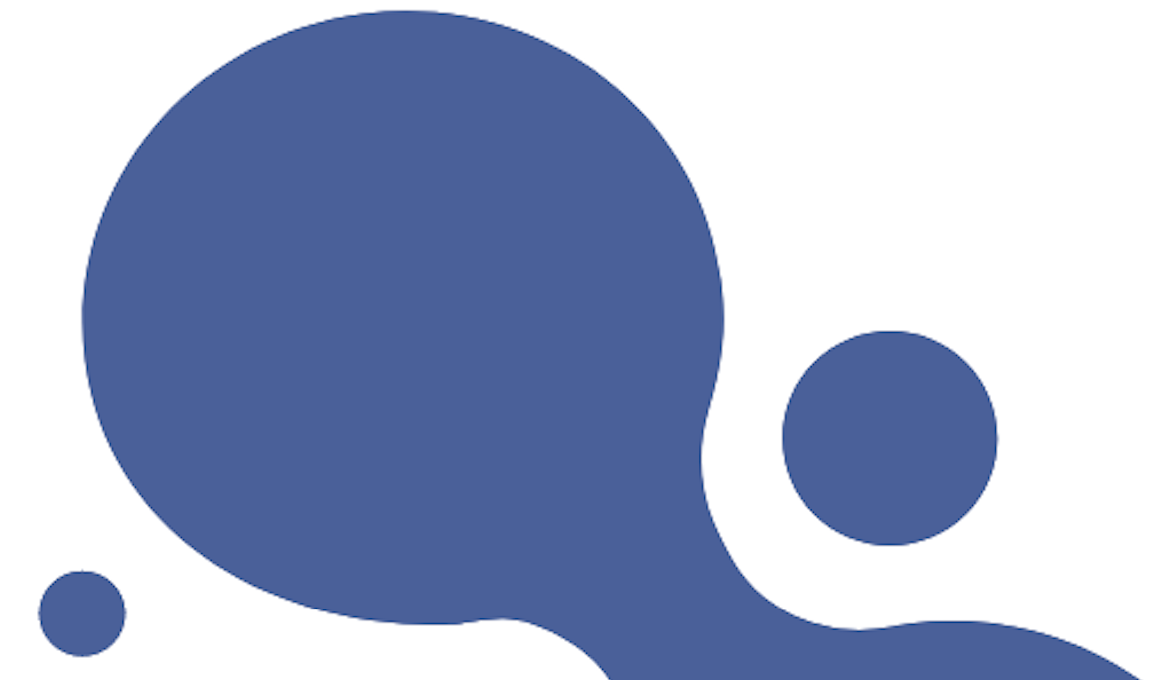
I want to tell young girls « do not censure yourself and don’t get stuck on a preconceived vision of your future »
Série Femmes, filles et sciences
Entretien avec Elodie Germani.
Le Service pour la science et la technologie de l’Ambassade de France en Allemagne met en lumière des femmes scientifiques et des managers de projets, en particulier des coopérations franco-allemandes scientifiques féminines, contribuant ainsi à la déclinaison par l’Ambassade de France en Allemagne de la stratégie internationale de la France pour une diplomatie féministe (2025-2030). Plus d’informations : https://de.ambafrance.org/Strategie-internationale-de-la-France-pour-une-diplomatie-feministe-2025-2030
Dr. Elodie Germani (https://elodiegermani.fr/) est chercheure postdoctorale à la clinique universitaire de Bonn, dans le laboratoire d’Albarqouni (https://albarqouni.github.io/), dans le domaine de la recherche en imagerie médicale computationnelle. En 2024, elle obtenu son doctorat en informatique à l’Université de Rennes, sous la direction du Dr. Camille Maumet et du Pr. Elisa Fromont. Elle a obtenu en 2024 le prix Jeunes Talents France L’Oréal-UNESCO Pour Les Femmes et la Science. (https://www.unesco.org/en/articles/loreal-unesco-women-science-young-talents-france-awards-35-female-researchers)
Can you introduce yourself, and your research?
Elodie Germani: My name is Elodie Germani, and I am a postdoctoral researcher in computer science for medical imaging. I earned my PhD in September 2024 from the University of Rennes in France. Since October 2024, I have been a postdoctoral researcher at the University Hospital of Bonn in Germany. My work focuses on managing variability in medical imaging and its impact on artificial intelligence models. The goal is to ensure that variability in medical imaging, whether due to individual differences, different hospitals, their acquisition methods, image quality, or data quantity, does not significantly affect the training of robust and inclusive artificial intelligence models.
My academic journey is quite atypical for my field. After high school, I started studying medicine in France. I loved medical sciences and human physiology, so I pursued medicine. By the fourth year, I was working part-time at the hospital and doing night shifts. But I then realized that research was what truly interested me. So, I took a gap year and decided to switch to bioinformatics. I completed a master’s degree at the University of Rennes, where I studied bioinformatics, which involves applying computer methods to biology, the human body, and health. After that, I continued with my PhD.
What is your connexion with Germany?
Elodie Germani: When I finished my thesis, the question arose: what should I do next? It is said that in France, if you ever hope to secure a permanent position as a researcher, you need to have international experience. So, during my final year of my thesis, I looked into it and searched for all the labs in Europe. I really wanted to work in medical imaging and on everything related to inclusive artificial intelligence. That is how I found this laboratory at the University Hospital of Bonn, directed by Professor Albarqouni. I have been working there since October 2024.
Is gender a subject in your research?
Elodie Germani: I would say yes and no. There are quite a few studies that have shown that if we train an artificial intelligence model on only a subtype of a subpopulation, we will have difficulty using it for other individuals who do not have the same characteristics. For example, with chest X-rays, if we train an artificial intelligence model only on men, it won’t work on women because the model will rely on characteristics specific to men. As a result, it won’t be able to perform its diagnostic or predictive tasks correctly. We have realized that there is a significant delay in everything related to the diagnosis and all the research on problems exclusively affecting women or where women have a physiology different from men. In the future, I would really like to specialize in this area. I have a project where I am interested in breast cancer and the use of artificial intelligence in mammography.
Do you advocate for women in research?
Elodie Germani: Since the beginning of my thesis, I have been greatly influenced by my thesis supervisor because I was mentored by two women, so we were a trio of women, which is not very common in computer science. Unfortunately, among all researchers with permanent positions in computer science, only 20% are women. There are fewer and fewer girls pursuing studies in this field and in sciences in general. I have experienced these stereotypes myself. This is also why I initially chose to study medicine. I was never encouraged to consider other options. I was a girl good at sciences, so I was pushed towards medicine without exploring other possibilities.
So, I have been involved in many scientific outreach activities to encourage more girls to pursue computer science. For example, we organized programming workshops for middle school girls. Last year, I applied for the Young Talents Prize for Women in Science from the L’Oréal Foundation and UNESCO. I was selected along with 34 other doctoral and post-doctoral students from France to receive this award. Now, I am an ambassador for women in science thanks to this prize. The idea is to show girls that they should not censor themselves, that anything is possible, and that they should not be limited by stereotypes of women in science.
Has gender impacted your experience as a woman in research?
Elodie Germani: I have mostly experienced imposter syndrome. I don’t look the part of my profession at all, and that’s what all my friends tell me: that if you see me on the street, you would never guess that I am a computer science researcher. It often surprises people when they meet me. As a result, you feel like you always have something more to prove than others because you have to prove even more that you deserve to be there and that you are not there for nothing. So, throughout my career, I have felt this pressure. Being a woman in computer science, there is always this question of quotas. Unfortunately, this also contributes to imposter syndrome because you always wonder, « Am I here because of my worth, or am I here because I am a woman? » Imposter syndrome is very common, at least among my female colleagues; 90% of them have felt the same way. It is true that, especially in a predominantly male environment, it is not easy to dare to speak up and take your place. There is also the issue of balancing private life and professional life in research when you are a woman, which is not straightforward. There are many studies before finally achieving stability. So, there is all this questioning about family and how it works. It’s true that men don’t ask themselves these questions, whereas women have to consider them, but it is almost taboo. Additionally, it’s not easy to build a network when you are a young researcher. With the L’Oréal prize, we spent a week among the laureates. We had training in leadership and management for women. I made some connections, including with a researcher working in medicine, and we considered potentially collaborating on a project. It’s also something quite unifying that encourages us to collaborate and build our network. So, this prize was very useful for meeting new people and getting to know others to facilitate more collaborations.
Did you notice differences between France and Germany in terms of gender?
Elodie Germani: I don’t necessarily see any real differences in the consideration of women in laboratories. I feel just as valued as I did when I was in France, even though now I have a male supervisor. I have been lucky.
What advice would you give to girls and young women?
Elodie Germani: My main advice is not to censor yourself and not to get stuck on stereotypes or a preconceived vision of your future and what you want to do, especially regarding sciences in general. This way, you won’t realize five years later that you made the wrong choice in terms of career path and that science isn’t so bad after all!
Entretien réalisé en français le 28 avril 2025 par Noela MULLER,
du Service pour la Science et la Technologie de l’Ambassade de France en Allemagne.

